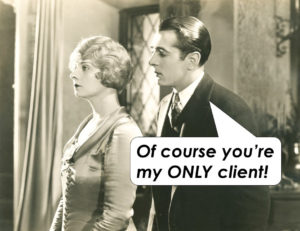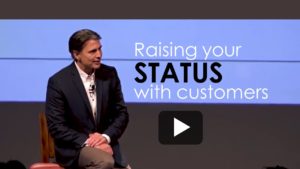Trusted Advisor Customer Service Blog Posts
Written By Jeff Mowatt – (all original content not AI generated)
Written By Jeff Mowatt – (all original content not AI generated)
Six Secrets to NOT share with Customers
Oversharing blunders that annoy customers and limit careers
 "I wish some of my team members would think more before they speak.” This was the comment made by a senior HR manager of a construction company where I was brought in to conduct Trusted Advisor training. She continued, “They inadvertently share more than our customers need to hear.” In today’s world of social media where people post their opinions and details of their lives for the entire world to scrutinize, we’re finding oversharing is a growing problem. Not only does it jeopardize customer loyalty; it also limits career advancement. See if you or your team members ever commit any of these top six oversharing blunders.
"I wish some of my team members would think more before they speak.” This was the comment made by a senior HR manager of a construction company where I was brought in to conduct Trusted Advisor training. She continued, “They inadvertently share more than our customers need to hear.” In today’s world of social media where people post their opinions and details of their lives for the entire world to scrutinize, we’re finding oversharing is a growing problem. Not only does it jeopardize customer loyalty; it also limits career advancement. See if you or your team members ever commit any of these top six oversharing blunders.
1. Referring to other customers
Customers like to feel that they are your only customer, especially if they do a lot of business with you. That’s why when you’re busy working on projects or orders for other customers, it’s important to keep that fact to yourself. Explain to the customer the steps you’re taking to keep things on schedule for him or her. Don’t mention other customers or projects that also require your attention.
2. Internal Affairs
Over the course of working with a client on a project, there may be internal issues - staffing shortages, unanticipated obstacles, equipment failures - that arise that affect their project. In general the customer doesn’t need nor want to hear about these problems unless they’ll effect the overall outcome. Even then, more important than hearing about obstacles, what the client really wants to know is your plan get the project back on track.
3. How the customer's needs compare to yours
When customers share details about themselves that you can relate to, there’s a temptation to jump in and share your similar experiences. But that’s not why the customer is there. It’s fine to be able to connect at a personal level, but your personal experiences can come later. In the early stage of the interviewing customers, it’s more important to dig deeper to find out what’s really behind their needs. It’s OK for customers to like you as friend when you have lots in common. But it’s more important for them to value you as their Trusted Advisor. Keep my little rhyme in mind: “Friends compare and overshare. Advisors ask and stay on task.” It’s a reminder to talk less and listen more.
4. TMI
At a hotel where I was hosting a conference, I phoned the main reception and asked to speak with the General Manager. The front desk receptionist tells me, “She’s working-out right now. Can you call back in an hour?” When I called back later the receptionist then explained, “She’s taking a shower now.” I’m not making this up! While that’s an extreme example of oversharing personal information with a customer, more common examples are references to coworkers who are… at lunch, sick today, on a smoke break, on holidays, with another customer (see blunder #1) etc. Best to simply tell the customer that the person is unavailable or out of the office until a certain time or day and offer to take a message.
Speaking of too much personal info, when customers ask how we are, they don’t want to hear lamentations about our physical or mental state or how anxious we are for our shift to be over. Buyers aren’t there to hear whining. It instantly diminishes the customer experience. Just remain positive and focus on helping the customer.
5. Obvious product features
Customers have so much access to information that when it comes to larger buying decisions they’ve often done their homework before contacting you. Explaining features which customers already know and understand sounds condescending. That’s why it’s important to begin that part of the conversation by asking, “How familiar are you with…?” Then as you describe your offerings, focus less on features and more on benefits as they relate to that particular customer.
6. Technical Jargon
In general, the higher-up the chain of command an internal or external customer is, the less interested they are in technical details. They are primarily interested in outcomes. So resist the urge to impress senior managers with how much of a technical expert you are. When an executive asks about the weather, they don’t want to be told how to make a thermometer.
The training solution
While discretion is said to be the better part of valor, I believe it’s also the better part of value - the value that customers and employers place on your service. The sad reality is that many employees aren’t even aware they are committing these blunders. Fortunately, all it takes is a single seminar to sidestep these oversharing errors and enhance customer experience. One thing is certain, unless employees are made aware of how their words can damage goodwill and hurt their own careers, they’ll continue to overshare.
The Biggest Avoidable Risk in Business
 Alain, a manager and sponsor of one of my speaking tours, introduced me by telling the audience about his shopping experience at a business that sold high end technology. He explained how the company had obviously spent millions of dollars on buildings, equipment, inventory, salaries, insurance, and advertising. However, the employee who interacted with him appeared to be having an off day and didn't seem concerned about whether Alain found what he needed. "In other words," Alain continued, "The company invested all that money building a brand to bring customers like me in the door. But one employee not being trained properly, meant all that money was wasted." The lesson is your team members ARE your brand. It only takes one untrained employee to eliminate brand value. Managers who neglect to train their team members on how to build trust, are subjecting the company's resources to substantial unnecessary risk.
Alain, a manager and sponsor of one of my speaking tours, introduced me by telling the audience about his shopping experience at a business that sold high end technology. He explained how the company had obviously spent millions of dollars on buildings, equipment, inventory, salaries, insurance, and advertising. However, the employee who interacted with him appeared to be having an off day and didn't seem concerned about whether Alain found what he needed. "In other words," Alain continued, "The company invested all that money building a brand to bring customers like me in the door. But one employee not being trained properly, meant all that money was wasted." The lesson is your team members ARE your brand. It only takes one untrained employee to eliminate brand value. Managers who neglect to train their team members on how to build trust, are subjecting the company's resources to substantial unnecessary risk.
Change One Word to become less Defensive with Unhappy Customers
 No one likes to hear customers complain. Employees become impatient and defensive when faced with these “trouble-makers.” One of my seminar participants equated listening to customer complaints to undergoing amateur eyeball surgery. (That can’t be good). To prevent this defensive mindset, employees need to be trained to treat customer complaints as concerns. Employees need to know that customers who express concerns are helping you to stay sharp and competitive. Focusing on customer concerns vs complaints will immediately shift a potentially negative situation into one that is positive and productive.
No one likes to hear customers complain. Employees become impatient and defensive when faced with these “trouble-makers.” One of my seminar participants equated listening to customer complaints to undergoing amateur eyeball surgery. (That can’t be good). To prevent this defensive mindset, employees need to be trained to treat customer complaints as concerns. Employees need to know that customers who express concerns are helping you to stay sharp and competitive. Focusing on customer concerns vs complaints will immediately shift a potentially negative situation into one that is positive and productive.
Negotiating with Nay-Sayers : Navigating Resistance
Communication Strategies - Navigating Resistance
It seems these days people are so pressured, so busy, and so over-regulated at work that it’s difficult to get their attention at all; let alone get them to do you a small service. Next time you find yourself dealing with a person who seems to be putting up more barriers than bridges, try this strategy. Before approaching them with your request have a fallback scaled-down plan B ready. If they decline your first request ask, “If you can’t do 'A' then can you at least do 'B'?” Immediately, the other person views you as being somewhat reasonable – after all you’ve ‘given-up’ is your plan 'A'. So, in the spirit of fairness the other person subconsciously feels that they need to give a little as well.
Be Discreet about Seeing Other Customers
 Imagine you're a customer asking a supplier about the status of a project that's delayed. The rep apologizes and explains that not only are they short staffed this week, but business is swamped with other customers who have rush projects. Unfortunately, that explanation gives the impression you are being slighted in favour of more important clients. Customers like to believe they're your only customer, even though they know it isn't true. That's why, despite how carelessly open we've become about revealing details of lives and our opinions on social media, it's important that - with customers at least - we use discretion. While it's Ok to mention that a few coworkers are off sick, we shouldn't bring up our other projects or customers. It's oversharing and it only makes customers wish they'd been dealing with a supplier who valued their business enough to make them more of a priority.
Imagine you're a customer asking a supplier about the status of a project that's delayed. The rep apologizes and explains that not only are they short staffed this week, but business is swamped with other customers who have rush projects. Unfortunately, that explanation gives the impression you are being slighted in favour of more important clients. Customers like to believe they're your only customer, even though they know it isn't true. That's why, despite how carelessly open we've become about revealing details of lives and our opinions on social media, it's important that - with customers at least - we use discretion. While it's Ok to mention that a few coworkers are off sick, we shouldn't bring up our other projects or customers. It's oversharing and it only makes customers wish they'd been dealing with a supplier who valued their business enough to make them more of a priority.
How Not to End your Emails
 I wish I'd learned this sooner. Eventually I discovered that the more you treat customers like smart adults, the more receptive they'll be to your expertise. Early in my career I used to finish my correspondence with phrases like, "If you have any questions, please don't hesitate to call..." Today, as a customer myself, I still receive emails that end with that phrase. Customers who have questions know they can ask. The offer to accept their questions is not only clichéd - which sounds like we're not really thinking about what we're writing - it's also condescending. Like the customer is too timid or too ignorant to ask questions. As I point out in my Trusted Advisor presentations, every phrase you share either builds or diminishes trust. Next time you write to your customer, you can avoid the unintended insult and invite a response by simply finishing with, "Your thoughts?"
I wish I'd learned this sooner. Eventually I discovered that the more you treat customers like smart adults, the more receptive they'll be to your expertise. Early in my career I used to finish my correspondence with phrases like, "If you have any questions, please don't hesitate to call..." Today, as a customer myself, I still receive emails that end with that phrase. Customers who have questions know they can ask. The offer to accept their questions is not only clichéd - which sounds like we're not really thinking about what we're writing - it's also condescending. Like the customer is too timid or too ignorant to ask questions. As I point out in my Trusted Advisor presentations, every phrase you share either builds or diminishes trust. Next time you write to your customer, you can avoid the unintended insult and invite a response by simply finishing with, "Your thoughts?"
Unpleasant news to give? Try this…
 Part of most people's job involves telling customers and co-workers information they don't really want to absorb. Fortunately, there is a simple technique that I share in this short video that makes bad news more palatable for customers to swallow, and makes your personal brand more appealing. Check it out and feel free to share with your colleagues.
Part of most people's job involves telling customers and co-workers information they don't really want to absorb. Fortunately, there is a simple technique that I share in this short video that makes bad news more palatable for customers to swallow, and makes your personal brand more appealing. Check it out and feel free to share with your colleagues.
Secret Desires of Corporate Clients
2 keys to boosting your business-to-business revenues
by Jeff Mowatt
 Who would you say buys your company’s offerings – corporate buyers, private consumers, or both? People who are buying products and services on behalf of their organizations have different needs than those who are buying for themselves. Losing a single consumer is unfortunate. Losing a large corporate client can create financial fallout. With so much at stake when you are selling ‘business-to-business’ here are a few tips I share in my seminars and speeches on how to gain and keep the loyalty of corporate clients.
Who would you say buys your company’s offerings – corporate buyers, private consumers, or both? People who are buying products and services on behalf of their organizations have different needs than those who are buying for themselves. Losing a single consumer is unfortunate. Losing a large corporate client can create financial fallout. With so much at stake when you are selling ‘business-to-business’ here are a few tips I share in my seminars and speeches on how to gain and keep the loyalty of corporate clients.
Why price isn't paramount
Corporate buyers are not spending their own money; they're spending their company's. So paying a higher price doesn't affect them personally. Corporate buyers are expected to choose the supplier who provides the best overall value. That brings us to two secret desires that your corporate customers won't tell you. Nor will they mention them in tender offerings or in requests for proposal. Knowing them will give you an edge in boosting your B to B revenues.
Desire #1 - Make them Look Smart to their Bosses
It's one thing to claim your products and services provide all kinds of benefits. It's an entirely different magnitude of value when you quantify how much of an impact you are having on that company. So when possible, provide your customer with evidence of the actual cost savings, quality improvements, waste reduction, that your products and services are generating for their business. Your corporate client can then forward those numbers to their bosses and take the credit for the improvements. And for being smart enough to choose you as their supplier. Everyone benefits.
Making your customers look brilliant also means giving them what they need - not necessarily what they ask for. Presumably, you're more attuned to the latest developments in your industry than your customers. Corporate customers typically only have expertise in their outputs - not in the inputs that you supply. So, it's up to you to bring innovations and suggestions on better ways your customers can achieve their goals. Make sure when you present these enhancements, you give them plenty of credit for being open to this innovation. I call this approach the humility advantage. Corporate clients have jobs they're trying to keep, turf they may be defending, and attention they're trying to garner. Why not indirectly help them achieve those goals?
Desire #2 - Make Their Jobs Easier
None of us wants to work harder than we have to. So when your business clients need answers, how accessible are you? Can they easily find answers, check real time inventory, place orders on your website, knowing that you will deliver as promised? If not online, how long does it take your corporate clients to talk to a human when they try to reach you? Our research shows that two of the most powerful words you can use with corporate customers are: hassle-free.
Making your business customers' job easier includes making their jobs more pleasant. In years past, making work more fun meant corporate entertaining... salespeople would wine, dine, and fly business clients to exotic destinations. Some would unfortunately go as far as offering bribes and kickbacks. Today's first world business environment is thankfully, much more transparent and ethical. Plus, corporate customers are so busy with their workload, fighting traffic, and juggling busy personal lives, they aren't particularly interested in socializing with their suppliers after hours. Private meal invitations can also create awkwardness.
With this in mind, one approach that's gaining popularity for entertaining corporate clients is staging special events that include food. Consider bringing a lunch-and-learn to your client or hosting an open house to groups of clients. Include some degree of education relevant to their job such as a speaker who can inform and engage them. Feed them while you teach them and they will come.
One last word on making your corporate clients' jobs more pleasant. In 1854 Henry Thoreau wrote that most people live lives of quiet desperation. To a certain extent I believe that's still true. Your client may be stuck in a dead end job and receive little recognition. So consider the value of offering them a specific compliment. Give a clear example of something they as a person do that makes them a special client. In a job where no one notices, you may be one of the few to make them feel appreciated.
Bottom line - remember that companies don't buy anything. It's people within those companies who make decisions. Make those people looker smarter to their bosses and make their jobs easier. Then notice how your prices suddenly become less relevant.




